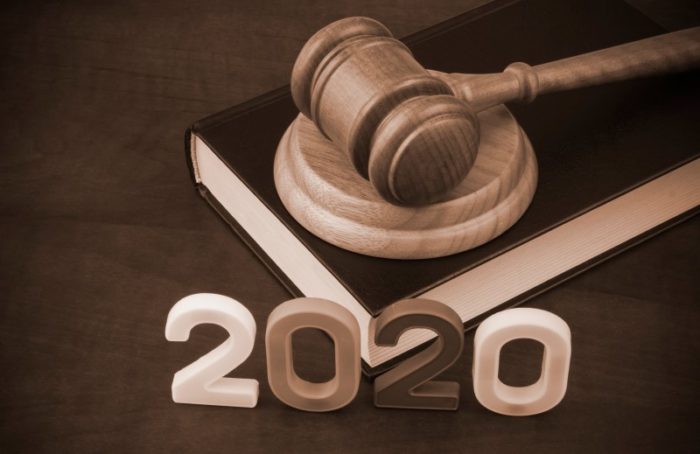
Probate litigators are likely aware of the general principal that a beneficiary’s rights and interests under a revocable trust do not vest to that beneficiary until the death of the settlor or settlors of that trust. Less clear, however, is what rights beneficiaries of a revocable trust have while the settlor or settlors are alive, but lack the mental competence to administer the trust or make further changes to their trust.
Adding to the confusion is the fact that new legislation, which took effect in 2022, significantly expanded the rights of revocable trust beneficiaries in situations where the person(s) who has ability to revoke or change the trust is deemed incompetent to effect such changes. Now, such beneficiaries have a more robust and defined ability to protect their beneficial interest in these situations. Still, beneficiaries and their counsel should be aware of their rights, as there is potential for their claims to be waived or barred if they are not timely pursued.
Table of Contents
How Do the Amendments to Probate Code 15800 Expand Beneficiary Rights?
Section 1
When Should Beneficiaries Bring Claims Under Probate Code 15800?
Section 2
When Is a Settlor Deemed Incompetent for Purposes of Probate Code 15800?
Section 3
Takeaway: Revocable Trust Beneficiary Rights Are Similar to Irrevocable Trust Beneficiary Rights, With Important Exceptions
Section 4
How Do the Amendments to Probate Code 15800 Expand Beneficiary Rights?
Prior to 2022, Probate Code section 15800 limited the rights of beneficiaries by cursorily stating that while a trust is revocable and the person(s) holding the power to revoke is competent, that only the person holding the right to amend or revoke has the rights afforded to beneficiaries under Division 9 (Trust Law) of the Probate Code, including for example, the right to contest the validity of that trust, or the right to obtain and challenge a trust accounting.
Thus, as it was previously drafted, Probate Code section 15800 did not offer probate litigators much guidance on the precise nature of the rights afforded to beneficiaries of a revocable trust when the settlors were alive but lacked competence to effect changes to their trust. That changed in 2022 when the legislature adopted a comprehensive revision to the wording of Probate Code section 15800, expanding and making explicit the rights of said beneficiaries.
What Are the Rights of Beneficiaries Under the Revised Probate Code 15800?
The amended Probate Code section 15800 codifies two additional provisions granting additional rights to beneficiaries of trusts where the settlor or settlors are alive but lack the competence to effect changes to their trusts.
Trustees Are Required to Provide Beneficiaries a Copy of the Trust Following Settlor’s Incompetence
First, Probate Code section 15800 (b) (1) requires that trustees provide a copy of the trust to beneficiaries within 60 days of the last person with the ability to amend a trust being deemed incompetent. This provision closely mirrors the requirements under Probate Code section 16060.7 and Probate Code section 16061.7 (g) (5), which require trustees to provide to beneficiaries of newly irrevocable trusts (i.e., because of the death of the trust’s settlor) the terms of the trust upon that beneficiary’s request.
In fact, the revised Probate Code section 15800 (b)(1) is slightly more robust, in that it does not require that the beneficiary formally request a copy of the trust, instead placing the onus solely on the trustee to make sure that each beneficiary is provided a copy of the operative version of the trust once the last person with the ability to amend or revoke a trust is deemed incompetent.
Trustees Are Required to Provide Beneficiaries with an Accounting and Trust Information Following Settlor’s Incompetence
Second, Probate Code section 15800 (b) (2) makes explicit that trustees of a trust where the settlors have been deemed incompetent are required to provide a trust accounting to beneficiaries and also provide to beneficiaries upon request, information relevant to the requesting beneficiary’s interest in the trust in accordance with Probate Code section 16061. These rights are otherwise generally only afforded to beneficiaries of irrevocable trusts.
Under What Conditions Does a Trustee Owe Duties to Beneficiaries Following a Settlor’s Incompetence?
Interestingly, Probate Code sections 15800 (b) (3)-(4) work to give trustees a large degree of discretion in determining whether a beneficiary is owed the duties described in subsections (b) (1)-(2).
Specifically, subsection (b) (3) states, “A beneficiary whose interest is conditional on some facts not yet in existence or not yet determinable shall not be considered a beneficiary for purposes of this section, unless the trustee, in the trustee’s discretion, believes it is likely that the condition or conditions will be satisfied at the time of the of the settlor’s death.” Read plainly, this could potentially apply to all beneficiaries of a revocable trust, since their interests are typically conditioned on, at a minimum, two facts: (1) surviving the settlor(s), and (2) on the settlor(s) not revoking or amending their trust to remove the beneficiary altogether.
This creates a situation where a trustee could argue that a beneficiary is not entitled to the benefits described by subsections (1) and (2) because, in the trustee’s discretion, the beneficiary’s interest will not vest to them, perhaps because the trustee believes that the beneficiary will not survive the settlor(s) or because the trustee believes that the settlor(s) may regain sufficient competence to amend or revoke their trust and eliminate that beneficiary.
Subsection (b) (4) goes on to state that if a trustee determines, pursuant to the provision of subsection (b) (3), that a given beneficiary is not entitled to the rights afforded under subsections (b) (1) and (2), the trustee instead owes these duties to the beneficiary that would, “next succeed to that interest at the relevant time or period as determined under the trust instrument[.]”
In such a case, Probate Code section 15800 could be construed to extend rights to beneficiaries of a class to which no other Probate Code section affords rights simply by virtue of a trustee’s “belief” and “discretion” that another class of beneficiaries’ interests will not vest to them because it is unlikely the conditions of subsection (b) (3) will be satisfied. Case law has not yet addressed these ambiguities.
In any event, the broad authority apparently granted to trustees in these subsections is ripe for contention, potentially pitting contingent beneficiaries of different classes against each other simply because a trustee exercised the poorly defined discretion granted to them by the revised Probate Code section 15800.
Though this has not yet occurred, given that the revision only recently took effect, it is safe to assume that it is only a matter of time before the court is forced to interpret the precise scope and nature of the discretion granted to trustees by Probate Code section 15800 (3) and (4).

When Should Beneficiaries Bring Claims Under Probate Code 15800?
The court places the onus on beneficiaries who believe that a settlor is incapacitated, to act without delay in moving to have the court enforce their rights under Probate Code 15800. If a beneficiary delays too long before seeking judicial or other confirmation of a settlor’s incompetence, then they may find that their attempt to invalidate disputed documents or otherwise protect their beneficial interest is barred by statutes of limitations or other affirmative defenses.
Drake vs. Pinkham: Beneficiaries Have Standing to Bring Claim Upon Suspecting the Settlor’s Incompetence
In Drake v. Pinkham, (2018) Cal.App.4th 400, the court held that a beneficiary contesting the validity of amendments to a trust on the basis of the amendments having been procured as result of undue influence was barred from pursuing such a claim by the doctrine of laches (an equitable doctrine that prohibits undue delay).
In making its ruling, the court relied on the fact that the contesting beneficiary was alleging that the settlor lacked sufficient competence to execute amendments to her trust after becoming aware of the suspect amendments four years prior to bringing her contest action. In dispensing with the beneficiary’s argument that she could not bring her claim earlier because she lacked standing to bring the contest action until after the settlor’s death, the court specified that the contesting beneficiary had standing to contest the validity of the contested amendments, by virtue of Probate Code section 15800 and Probate Code section 17200, as soon as she suspected that the settlor lacked the competence to execute the suspect amendments.
Instead of waiting over four years until the settlor’s death to bring the action, the beneficiary should have brought the contest petition when she first learned that the suspect amendments had been executed at a time when the beneficiary had believed the settlor to have lacked the competence to execute such amendments.
Starr v. Ashbrook: Beneficiaries Should Timely Pursue Claim Rather Than Waiting for Settlor’s Death
The court’s ruling in Starr v. Ashbrook, (2023) 87 Cal.App.5th 999, confirms its ruling in Drake and makes clear that a beneficiary contesting the validity of an incompetent settlor’s trust has standing to pursue such a claim when they believe that the settlor is incompetent, and they should timely pursue this claim rather than waiting until the settlor’s death.
Like Drake, the court in Starr held that a beneficiary contesting the validity of a trust where the settlor is alive but incompetent has standing to bring an action contesting the terms of the trust and need not wait until the settlor has passed away. The court in Starr also makes clear that it is sufficient for the beneficiary to simply allege incompetence to give the beneficiary standing under Probate Code section 15800; establishing a settlor’s incompetence is not a threshold issue that must first be determined prior to allowing a contest action to proceed. Starr V. Ashbrook, (2023) 87 Cal.App.5th 999, 1016-1017.
These cases make clear that a beneficiary should pursue an action enforcing their rights under Probate Code section 15800 as soon they believe a settlor is incompetent, as they have standing to pursue such a claim prior to settlor’s passing and any delay could result in the beneficiary being barred from bringing the claim in the future.
When Is a Settlor Deemed Incompetent for Purposes of Probate Code 15800?
The revision to Probate Code section 15800 (c) makes explicit that a settlor can be deemed incompetent either through the method contained in the trust itself or through a judicial determination of incompetence.
Does a Settlor’s Conservatorship Trigger Beneficiary Rights Under Probate Code 15800?
Counterintuitively, a judicial determination that a person with the power to revoke a trust should be subjected to conservatorship does not appear to trigger a beneficiary’s rights under Probate Code section 15800, Johnston v. Kotyck, (1999) 76 Cal.App.4th 83, 88 – 90.
At first glance, this is paradoxical, given that the primary purpose of conservatorship actions is to determine that a conservatee is incapacitated to a degree that they are unable to handle their personal or financial wellbeing. The reasoning for this seems to be that although a person holding the right to revoke is incapacitated for the purposes of the conservatorship, that person’s conservator, in conjunction with the court’s supervision and jurisdiction, is a surrogate for the incapacitated settlor who could exercise, with the court’s approval, an amendment or revocation of the conservatee’s trust. Ibid.
Because the changes to Probate Code section 15800 were intended by the legislature to expand a beneficiary’s ability to protect and preserve their interests, and because conservatorships remain within the court’s jurisdiction while the conservatorship is in place, it seems apparent that the safeguards put in place by the conservatorship are sufficient to protect a beneficiary’s interest during the lifetime of the incapacitated settlor, such that that beneficiaries do not also need the additional safeguards put in place by the revised Probate Code section 15800.
In any event, it is important to note that the additional rights afforded under the revised Probate Code section 15800 do not apply when a settlor retaining the right to revoke or amend a trust has been deemed incompetent through a formal conservatorship proceeding.
Takeaway: Revocable Trust Beneficiary Rights Can Be Similar to Irrevocable Trust Beneficiary Rights, With Important Exceptions
Though the revised Probate Code section 15800 makes clear that the rights of beneficiaries of revocable trusts where the settlor or settlors have been deemed incompetent are similar to those of beneficiaries of irrevocable trusts, there are important distinctions that could significantly impact overall case strategy and the potential outcome of a litigated case.
Probate litigators should be aware of the extent of rights of beneficiaries of trusts where the settlor is alive but incompetent – both so they can fully advise their clients on the extent of their rights, and also ensure that their clients’ right to preserve these interests are not waived.





